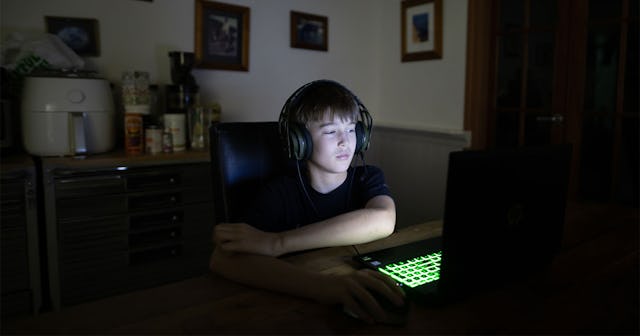Why Teens Are Less Likely To Follow COVID-19 Safety Rules

I’m going to be honest here. Since March of this year, I’ve been faced with a number of challenges. I’ve had to figure out how to work from home while also educating my children. I’ve had anxiety about everything — from the health and safety of family and friends, to the very real risk of losing my job. There has been the stress on my marriage of living through a pandemic, and the stress of paying bills after a salary reduction. But at the top of the list of all of these challenges has been trying to get my teenage son to understand the importance of following COVID-19 related safety guidelines.
He’s 13, and let me tell you, he knows how to make his own pancakes, and that somehow translates to him knowing a lot about everything, and informing the whole family about his opinions on what is and isn’t safe. He likes to point out contradictions, because you know, that’s what teenagers do. And he is always on the push to move the rules around so he can spend time with his friends. And you know what, on the whole, he’s not a bad kid, and nothing he’s doing is atypical behavior for his age, but when you are looking down the barrel of a pandemic, keeping your teenager safe can be a real stressor.
So why are teenagers struggling so hard with following COVID-19 rules?
Well… according to the experts, there are two things to consider, and the first and foremost is brain development.
And according to Dr. Judith G. Edersheim, co-director of the Massachusetts General Hospital Center for Law, Brain & Behavior, most teenage actions and disinterest in following COVID-19 safety rules can be blamed on the developing teenage brain. “Adolescents are programmed to seek independence. Pushing limits and taking risks are the evolutionary way in which they master these challenges. Blaming teenagers for their illicit socializing is like faulting a bird for leaving the nest — it runs counter to a basic biological imperative. But ignoring this risky behavior poses a grave threat to themselves and the rest of us.”
As maddening as it is to try to get our teenagers to stick to the basic rules of mask wearing and social distancing, it obviously goes in direct contrast with their need to socialize and push up and out into the world. This is the reason you are seeing college campuses implementing a long list of safety measures, only for students to disregard them by throwing a massive mask-free party, and ending up with an outbreak. This is why you are having one argument after another with your teen about staying away from friends, only for them to lie about where they were because they just really, really, needed to see their friends at the beach.
So what’s the second reason? Well… it’s grief.
According to psychologist Robin Gurwitch, from Duke University, in Durham, N.C., a lot of kids are experiencing loss. “Many teens aren’t getting to participate in typical rites of passage–getting your driver’s license at 16, sports competitions, proms, graduations, and even younger children have activities they’re not doing. We need to acknowledge that there is grief and anger and frustration and sadness,” she said. And those feelings are causing teenagers to act out in strange ways to make up for those losses. They are being more impulsive than they might be otherwise, and they are pushing boundaries even at the risk of further spreading the infection.
In the case of my son, I must say, his soccer season was canceled. He hasn’t been able to see his friends for months, and he won’t be able to anytime soon because our school district just went online. And it’s in moments like this where it’s good for me, and for all parents, to acknowledge that hardship when approaching our children about why they are fighting us so hard on this whole social distancing thing.
So what are parents to do? Well… going back to Gurwitch, acknowledging that, “It’s part of their normal developmental trajectory to try to make their own decisions, and now, the response to the virus is taking all their sense of control away.” It’s also good to discuss with them the loss that they might be experiencing due to COVID restrictions. Being understanding can really go a long way when it comes to getting your teen to follow along. And I know this might be a tall order with how inconsistent COVID-19 regulations have been up to this point, but trying to be consistent with your expectations can really make a difference when explaining the COVID-19 safety rules.
But I must say, as frustrating as it has been personally to get my son on board with COVID-19 safety, knowing that this is typical teenage behavior, and that he is struggling with his own grief, does give me some insight into his mindset. And sometimes, figuring out how to meet your child in the middle can be a huge advantage.
This article was originally published on